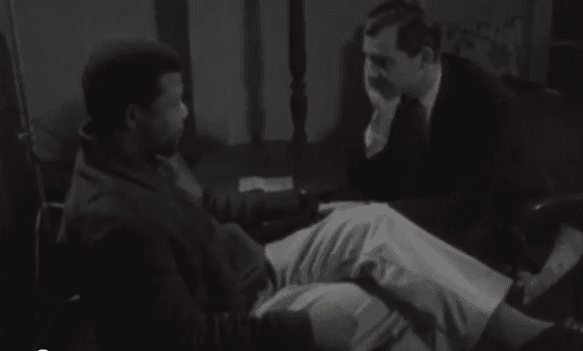Watch Mandela’s first TV interview, when he was on the run
Reporter Bryan Widlake and Nelson Mandela speak in a safe house during Mandela’s first ever television interview
In 1961, when Mandela was a 42-year-old African lawyer, he gave his first clandestine interview to ITN television. He’d already been arrested for his anti-apartheid work and was being hunted by police.
In the South African press, he was portrayed as a dangerous revolutionary. So ITN reporter Brian Widlake didn't know what to expect.
With the help of South African nationalists, Widlake arranged to meet with the man he called “the most wanted in all of Africa” at a small safe house, in the dark hours of the night.
They chose the location for two reasons — it was very remote and it had two exits, so they could “get out fast” should the security people find them.
“The actual meeting was very odd,” Widlake remembers. “I was sitting there, ready to go, and I didn’t realize until I looked back over my shoulder, there he was. He’d just walked silently into the room, almost like a cat burglar. He was a large man, 6’2” or something of that nature, dressed in black leathers and a black baseball cap, posing, as far as the security people were concerned, as a taxi driver.”
Widlake wasn’t prepared for the man he met. “He gave the impression he really believed that he was capable of leading that great country back to freedom, and the freedom of spirit. At that time, I didn’t believe it. I looked at him and wondered in the back of my mind, 'is Nelson Mandela almost too good to be true? Is there perhaps the seeds of terrorism somewhere lurking beneath his skin?'”
His thoughts echoed the fear and suspicions that gripped South Africa's white population at the time — if black leaders came into power, Widlake asked Mandela, would “they be absolutely brutal in revenge against the white man?”
“He looked at me in astonishment, as if I didn’t know what he’d said, about everybody in South Africa — black, white, yellow, or any color under the sun — they would always be treated in exactly the same way if a black government was installed. He was quite definite about that and he looked very surprised, as if, ‘See, you haven’t really been listening, you don’t really believe me, do you?’"
At the time, few did. Several months after the inteview, Mandela was arrested and sent to Robben Island prison, where he remained for 18 of his 27 years in prison.
Finally freed in 1990, Mandela lived to see his once-unbelievable dream of a black-led government come true.
"A remarkable man," Widlake remembers. "He was gentle, patient, immensely clever. A superb negotiator. But above all, he was a great human being. And I think he will be remembered for that above anything else."
We want to hear your feedback so we can keep improving our website, theworld.org. Please fill out this quick survey and let us know your thoughts (your answers will be anonymous). Thanks for your time!
